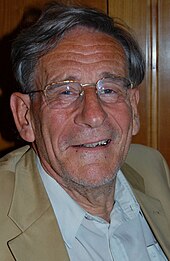Hinderk Meiners Emrich
Hinderk Meiners Emrich (born July 2, 1943 in Witzenhausen near Kassel ; † September 16, 2018 ) was a German psychiatrist , psychoanalyst and philosopher . As a scientist and clinician, Emrich endeavored to integrate the humanities and neurobiological foundations of his discipline and to draw conclusions from this for individual therapies and social concepts. In addition to his work as full professor of psychiatry and psychotherapy at the Hannover Medical School from 1992 to 2008, Emrich received teaching assignments at various faculties of the humanities.
life and work
Hinderk Meiners Emrich was founded in 1943 as the son of the study assessor Lina Helene Emrich, born Hinderks, and Wendelin Wilhelm Emrich born in Witzenhausen near Kassel.
In 1962 he began studying medicine at the Free University (FU) Berlin . He carried out his first research work in the pre-clinical center at the Physiological Institute under the direction of Karl Julius Ullrich . In 1968 Emrich received his doctorate from the University of Bern with a thesis on cystic fibrosis . In addition to further research work at the Max Volmer Institute for Physical Chemistry at the Technical University (TU) Berlin , he completed his time as a medical assistant and received his license to practice medicine in 1970 . In 1972, Emrich obtained his habilitation in medicine for the subject of "Molecular Neurobiology" at the Technical University.
As part of his specialist training, he initially worked as an assistant doctor in the psychiatric department of the Haar district hospital and later in both the psychiatric and neurological departments of the Max Planck Institute for Psychiatry in Munich. In 1978 he passed his specialist examination to become a neurologist and received an unscheduled professorship .
During this time Emrich was instrumental in the discovery of the psychopharmacological effects of carbamazepine , originally an anticonvulsant substance, for the treatment of people with bipolar disorder . He obtained his habilitation in psychiatry in 1986. In the late 1980s and early 1990s, Emrich acquired additional qualifications in the field of psychotherapy ( behavioral and depth psychological procedures, “training analyst ”) and pharmacology.
In 1992 he was appointed to the C4 professorship for psychiatry at the Hannover Medical School, succeeding Karl Peter Kisker . There Emrich continued his multi-faceted research, always combining humanities and neurobiological approaches. In addition to many other projects, Emrich has recently mainly dealt with schizophrenia research, especially the hollow mask paradigm.
Since the 1990s, Emrich has been visiting professor at the Max Planck Institute for Extraterrestrial Physics , at the C. G. Jung Institute in Munich, at the Cologne Academy of Media Arts and at the Be'er Scheva University in Israel. In 1999 Emrich received his doctorate in philosophy at the Ludwig Maximilians University in Munich on J. G. Fichte's transcendental philosophy . At the end of his time as professor for psychiatry and psychotherapy, Emrich received a teaching position for philosophy at the Leibniz University of Hanover . Emrich received further teaching assignments from the University of Witten / Herdecke , the State University of Design in Karlsruhe and the Humboldt-Kolleg Berlin.
In addition, Emrich was always involved in artistic projects, theater productions and readings as well as film studies and film projects. So he advised the director Hans Weingartner for the film " The white noise " about a young man with schizophrenia and also acted in action (e.g. " Free Rainer ", " The child's Mozart @ sotto voce. In the night ") .
After his retirement in 2008, Emrich continued his academic and artistic work from Hanover and, in parallel, prepared the publication of his collected lectures and writings.
Hinderk Meiners Emrich died after a long illness in September 2018 at the age of 75.
Fonts (selection)
- With Udo Schneider and Markus Zedler: What color is Monday? Synesthesia: Life with linked senses. Hirzel, Stuttgart and Leipzig 2002
- Identity as a Process. Königshausen & Neumann, Würzburg 2007
- Texts on Rilke (collection of articles). Cuvillier, Göttingen 2008
- Psychiatric Anthropology. 2 vol., Königshausen & Neumann, Würzburg 2008/2012
- with Michael Roes : Angel and Avatar. A dialogue about real and virtual worlds. Matthes & Seitz, Berlin 2011, ISBN 978-3-88221-580-9 .
- with Michael Roes: Some contradicting comments on the futility of love: a conversation. Alibri, Aschaffenburg 2015, ISBN 978-3-86569-186-6 .
- Saying the unspeakable: on the musicalization of life. Books on Demand, Norderstedt 2015, ISBN 978-3-7386-4841-6 .
- with Edgar Reitz : The magical room. Conversations on the philosophy of cinema. Schüren, Marburg 2016, ISBN 978-3-89472-998-1 .
Literature (selection)
- Nicola Zellmer: Hinderk M. Emrich / Der Menschen (er) forscher , in: Hannoversche Allgemeine Zeitung of February 9, 2009 (updated February 12, 2009)
- Is my blue your blue Neurophilosophical considerations on synesthesia . Audio CD. Concept and direction: Klaus Sander, Anja Theismann. Narrator: Hinderk M. Emrich, Manuela Lube, Matthias Waldeck. supposé 2008, ISBN 978-3-932513-83-1 .
Web links
- Literature by and about Hinderk Meiners Emrich in the catalog of the German National Library
- Hinderk Meiners Emrich website
Individual evidence
-
^ Obituary notice from the Hannover Medical School (MHH) in the daily newspaper [[Neue Presse (Hannover) |]] from September 22, 2018, p. 7; online
obituaries:
Petra Rückerl: MHH professor Hinderk Meiners Emrich is dead , Neue Presse, September 24, 2018.
Juliane Kaune: Psychiatrist Hinderk Emrich died , Hannoversche Allgemeine Zeitung , September 25, 2018.
Margarete Leibig: News: Obituary Prof. Dr. med. Dr. phil. Hinderk Emrich , International Society for Depth Psychology eV
| personal data | |
|---|---|
| SURNAME | Emrich, Hinderk Meiners |
| ALTERNATIVE NAMES | Emrich, Hinderk M .; Emrich, Hinderk |
| BRIEF DESCRIPTION | German psychiatrist, psychoanalyst and philosopher |
| DATE OF BIRTH | July 2, 1943 |
| PLACE OF BIRTH | Witzenhausen , Kassel |
| DATE OF DEATH | 16th September 2018 |


